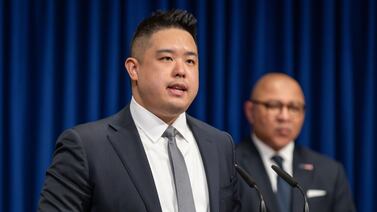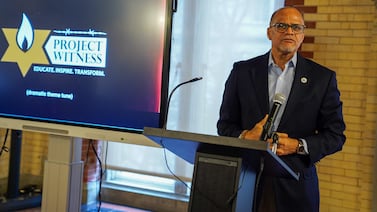Hoosier families on average face limited access to child care — with most residents having a tough time finding quality care that meets their family’s needs, a study by child care advocates reports.
On a scale of zero to 100, the state as a whole scores 60.6 in child care access — what the study rates as just barely “moderate” — while 86% of its counties have “inadequate access,” the report by the non-profit Early Learning Indiana says. The report includes an interactive map to look up county-by-county child care details.
Unlike previous studies, the group’s analysis, released Tuesday, considers several factors besides available seats when rating child care across the state — including quality, affordability, and choice.
The report notes that Indiana has an estimated 478,800 children under age 6. About two-thirds of those children require care because they live in households where all the adults are working. Data shows about 117,000 of those children are enrolled in licensed programs, but the care arrangement for the remaining children are unknown.
That insufficiency matters because studies have shown that early care and learning play critical roles in a child’s development and future.
“The brain develops more rapidly during the first five years of life than at any other time,” Maureen Weber, president of Early Learning Indiana, said. “It matters a lot what kind of environment children are in for 8, 10, maybe 12 hours a day when this period of very rapid development is occurring.”
The study examines what care is available to families within a 10-mile radius, which is about how far people are willing to drive to access high-quality care.
The report notes that access varies across the state. Generally families in urban areas can more readily find high-quality care, compared with families in rural areas.
“We have long known that care in rural communities presents unique challenges given the distances and overall levels of population,” Weber said.
On the 0-100 scale of how well existing child care meets needs, Marion County scores 71.5 — one of the state’s higher scores. The county has had long-standing support for child care from organizations like the United Way of Central Indiana, Weber said. But more than half of the state’s census tracts have inadequate access to programs serving children up to age 5 who need care.
Supported by Lilly Endowment Inc., Early Learning Indiana is offering grants of up to $100,000 to provide high-quality child care. Weber said the group will award at least 10 non-renewable grants, to cover an average of 18 months, to build capacity. The program aims to expand care for 1,000 children. The deadline for proposals is Oct. 8.
Nearly $70 million has been distributed with support from the state for day care centers to safely stay open. The state is continuing to invest in pre-kindergarten but without increasing state funding.
Studies have shown that children who participate in high-quality early-learning programs have improved long-term academic results and better health outcomes.
Good early-learning programs also can help children who suffer the stress of coping with adversity, Weber said.
“They bring with them a number of challenges that can stay with them well into their K-12 experience,” Weber said. “On the other hand, if they have early childhood experiences that are positive, with adults that are providing for their needs and helping to foster that brain development that is happening anyway, that pays dividends for years into K-12.”
Weber said that children need caring adults who want to foster curiosity and build resilience.
This story has been updated to clarify the number of children under age 6 who need care.








